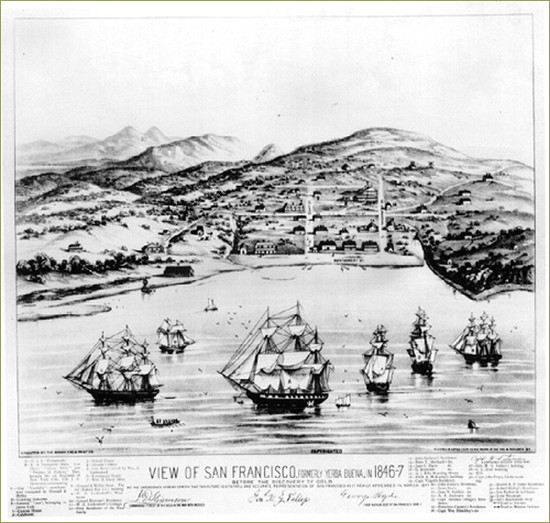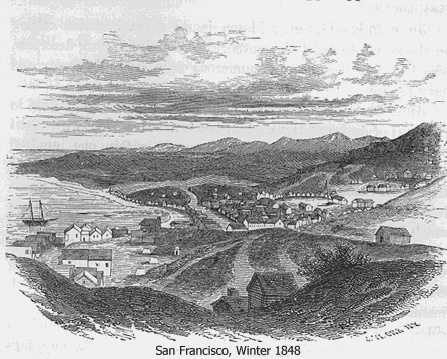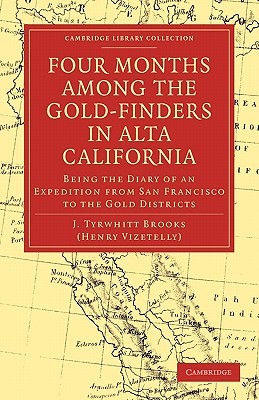Henry Vizetelly, an English publisher who was in San Francisco at the time of the 1848 gold discovery, wrote a novel entitled Four Months Among the Gold-Finders in Alta California: Being the Diary of an Expedition from San Francisco to the Gold Districts. He used the pseudonym J. Tyrwhitt Brooks.
Fiction or not, the novel was published in 1849 and was written by someone present in San Francisco during the Gold Rush. The descriptions of the condition of San Francisco and other places in 1848 are likely to be more accurate than later accounts.
The book is written as a series of diary entries by the doctor, J. Tyrwhitt Brooks, who arrives in San Francisco in late April 1848, intending to offer his medical services to the U.S. Army in California in the waning days of the Mexican-American War.

Our fictional Dr. Brooks describes the ship’s passage through the Golden Gate and into the bay and town:
… I felt heartily glad to hear that we were then clearing the Faranolles [sic, these are the Farallon Islands, just off the coast of San Francisco] and soon hurried up on deck, but we continued beating about for several hours before we made the entrance to the Bay of San Francisco. At length, however, we worked our way in between the two high bluffs, and along a strait a couple of miles wide and nearly five miles long, flanked on either side with bold broken hills – passing on our right hand the ricketty-looking fortifications erected by the Spaniards for the defence of the passage, but over which the Yankee stars and stripes were now floating. On leaving the strait we found ourselves on a broad sheet of rippling water looking like a great inland lake, hemmed in on all sides by lofty hills on which innumerable herds of cattle and horses were grazing, with green islands and clusters of rock rising up here and there, and a little fleet of ships riding at anchor. On our right was the town of San Francisco.
Those of us familiar with San Francisco Bay can picture the Golden Gate strait, with its lofty hills on either side, and the great inland “lake” of the bay. I used a similar description in my novel about the Gold Rush when my protagonist arrives in San Francisco in 1848.
Vizetelly’s novel continues with an April 29, 1848, journal entry:
. . . This morning we all rose early, and went on shore. The little baggage we had we took in the boat. . . . We made our way to Sweeting’s hotel, which Malcolm and McPhail had visited yesterday, and stated to be the best of the three hotels which have sprung up here since the Americans became masters of the place.
. . .
San Francisco, although as yet but a poor place, will no doubt become a great emporium of commerce. The population may be about a couple of thousands; of these two-thirds are Americans. The houses, with the exception of some few wooden ones which have been shipped over here by the Americans, are nearly all built of unburnt bricks. The appearance of the native Californian is quite Spanish. The men wear high steeple-like hats, jackets of gaudy colours, and breeches of velvet, generally cotton. They are a handsome swarthy race. The best part in the faces of the women are their eyes, which are black and very lustrous. The Californian belles, I am sorry to say, spoil their teeth by smoking cigarettos.

Think of San Francisco having only three hotels! Of course, with a population of only two thousand, three may have been sufficient. But that didn’t last for long, as within two years San Francisco’s population burgeoned with gold seekers and their commercial supporters.
Vizetelly’s protagonist Brooks makes no mention of the discovery of gold when he first arrives in San Francisco. Within days, however, he and his companions travel to Monterey, where they first hear rumors. The May 4, 1848, journal entry says:
. . . Mr. Bradley accompanied me to the Governor’s house, where we saw Colonel Mason, the new governor of the State. . . . Colonel Mason then asked Mr. Bradley if he had heard the reports of gold having been found on the Sacramento, as Mr. Fulsom had casually mentioned in a letter to him that such rumours were prevalent at San Francisco. Bradley replied that he had heard something about it, but believed that there was no truth in the matter, although a few fools had indeed rushed off to the reputed gold mines forthwith. With this our interview terminated.
Brooks then returns to San Francisco, seemingly uninterested in the gold. By May 8, however, he hears more:
. . . Captain Fulsom called at Sweeting’s to-day. He had seen a man this morning who reported that he had just come from a river called the American Fork, about one hundred miles in the interior, where he had been gold-washing. Captain Fulsom saw the gold he had with him; it was about twenty-three ounces weight, and in small flakes. The man stated that he was eight days getting it, but Captain Fulsom hardly believed this. He says that he saw some of this gold a few weeks since, and thought it was only “mica,” but good judges have pronounced it to be genuine metal. He talks, however, of paying a visit to the place where it is reported to come from. After he was gone Bradley stated that the Sacramento settlements, which Malcolm wished to visit, were in the neighbourhood of the American Fork, and that we might go there together; he thought the distance was only one hundred and twenty miles.
And by May 10, the rumors are rampant:
. . . Yesterday and to-day nothing has been talked of but the new gold “placer,” as people call it. It seems that four other men had accompanied the person Captain Fulsom saw yesterday, and that they had each realized a large quantity of gold. They left the “diggings” on the American Fork (which it seems is the Rio de los Americanos, a tributary to the Sacramento) about a week ago, and stopt a day or two at Sutter’s fort, a few miles this side of the diggings, on their way; from there they had travelled by boat to San Francisco. The gold they brought has been examined by the first Alcalde here, and by all the merchants in the place. Bradley showed us a lump weighing a quarter of an ounce, which he had bought of one of the men, and for which he gave him three dollars and a half. I have no doubt in my own mind about its being genuine gold. Several parties, we hear, are already made up to visit the diggings; and, according to the newspaper here, a number of people have actually started off with shovels, mattocks, and pans to dig the gold themselves. It is not likely, however, that this will be allowed, for Captain Fulsom has already written to Colonel Mason about taking possession of the mine on behalf of the Government, it being, as he says, on public land.
 Brooks and his fellow travelers soon make plans to go to the gold fields, where they spend four months, their tale told in the remainder of Vizetelly’s novel.
Brooks and his fellow travelers soon make plans to go to the gold fields, where they spend four months, their tale told in the remainder of Vizetelly’s novel.
As Vizetelly’s book makes clear, the California Gold Rush was the source of great stories, both true and fictional. Novels written close to the time of the history on which they were based are a wonderful source of color for later novelists.
When have you relied on a novel of the times to learn something about history?



